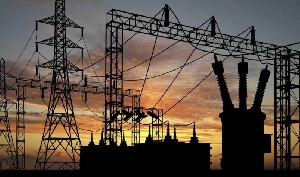Nigeria's Power minister Adebayo Adelabu has said the country can no longer sustain the power subsidy.
Mr Adelabu said that subsidising the cost of electricity had resulted in the government owing a debt of 1.3 trillion naira ($857m; 682m) to power generating companies and an additional $1.3bn to gas companies, local media reported.
The minister added that Nigeria has allocated 450bn naira to electricity subsidies this year, but findings show that the subsidies could end up costing 2.9 trillion naira.
Earlier this month, the International Monetary Fund (IMF) advised Nigeria to remove the electricity subsidy in order to restore economic stability, but some Nigerians fear that the subsidy's withdrawal could worsen economic hardship.
The West African country is currently experiencing a cost-of-living crisis, with many struggling to survive.
In May last year, President Bola Tinubu removed the fuel subsidy, which had been in place for decades and kept the price of petroleum products low.
The move led to increases of up to 200% in fuel prices and had a knock-on effect on the economy, increasing the prices of food and other necessities.
Africa News of Thursday, 15 February 2024
Source: bbc.com

















